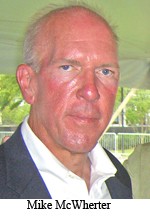Naming “crime, cronyism, and corruption” as major issues in
this year’s mayoral election, candidate Carol Chumney addressed the
Germantown Democratic Club Monday night, pledging if elected to “get a good
team” in order to bring renewed efficiency to Memphis city government.
Subsequently, city council member Chumney fielded at least
two questions from the membership (which includes several Memphis voters who
live in Cordova) about her reported difficulties with the mayor’s office and
fellow council members.
One member asked: What about her “relation building” and
“leadership style”? Would these be obstacles?
Chumney responded that she had developed good relations
with fellow legislators while a state House member for 13 years and said, “City
government has been a little different because there’s been quite frankly some
corruption. Many times I would be the only one who would stand up and say
anything. Some folks are going to get mad at you. I’m a strong leader, I will
tell you that.”
When another member followed that up by asking if the city
council would back her proposals if she were elected mayor, Chumney said, “We’re
going to elect a new city council.” Noting the virtual turnover of membership in
the county commission in last year’s elections, she expressed confidence that
city voters would follow suit. “It’s going to happen here. They’re going to vote
and vote in a new team.”
Pledging to renew cooperation between city and county
law-enforcement teams, Chumney said, “It’s disrespectful to expect the police to
go two years without a pay raise while asking them to risk their lives for us.”
She repeated her objections to Riverfront Development
Corporation proposals, including the recently approved Beale St. Landing
project, and called both for the city’s retention of The Coliseum and for
“something classy” in the downtown Pyramid.
Chumney said she’d heard “disturbing rumors” about the past
management of Memphis Networx and reported plans for its pending sale and
promised “to get to the bottom of it.” She said the council’s authority over a
prospective sale was uncertain but said she was seeking authoritative word on
that from the state Attorney General’s office.
candidates running for office in adjacent Memphis. A week or so earlier members
of the Republican Women of Purpose organization heard a presentation at the
Germantown Public Library from Brian Stephens, city council candidate in
District 2, the East Memphis-suburban seat being vacated by incumbent Brent
Taylor
Stephens has been active in an effort to strengthen laws
regulating sexually oriented businesses (S.O.B.’s in the accepted jargon) and
specifically to make sure that veteran topless-club entrepreneur Steve Cooper
does not convert a supposed “Italian restaurant” now under construction in
Cordova into an S.O.B.
He discussed those efforts but offered other opinions as
well, some of them surprising – a statement that “consolidation is coming,
whether we like it or not,” for example – and some not, like his conviction (a
la Taylor) that tax increases are not necessary for the city to maintain and
improve basic services.
In general, Stephens, who seems to have a head start on
other potential District 2 aspirants, made an effort to sound accommodationist
rather than confrontational, stressing a need for council members to transcend
racial and urban-vs.-suburban divisions and expressing confidence in the ability
of currently employed school personnel to solve the system’s problems.
establishing an apparent early lead over potential rivals is current school
board member Stephanie Gatewood, running for the District 1 council seat
being vacated by incumbent E.C. Jones. Gatewood’s fundraiser at the Fresh
Slices restaurant on Overton Park last Thursday night drew a respectable crowd,
and her membership in Bellevue Baptist Church on the suburban side of District 1
provides an anchor in addition to an expected degree of support from the
district’s African-American population.
earlier, Wednesday night, had been a hot one for local politics, with three
more-than-usually significant events, and there were any number of dedicated
and/or well-heeled visitors to all three:
–Residents of the posh
Galloway Drive area where U of M basketball coach John Calipari resides
are surely used to long queues of late-model vehicles stretching every which way
in the neighborhood, especially in election season when Calipari’s home is
frequently the site of fundraisers for this or that candidate.
But Wednesday night’s event, a $250-a-head fundraiser for District 5 city
council candidate Jim Strickland, was surely a record-setter –
out-rivaling not only Calipari’s prior events but most other such gatherings in
Memphis history, including those for senatorial and gubernatorial candidates. A
politically diverse crowd estimated at 300 to 500 people showed up, netting
Strickland more than $60,000 for the night and bringing his total “cash on hand”
to $100,000.
–Meanwhile, mayoral candidate Herman Morris attracted
several hundred attendees to the formal opening of his sprawling, high-tech
campaign headquarters on Union Avenue – the same HQ that, week before last,
suffered a burglary – of computers containing sensitive information, for one
thing – a fact that some Morris supporters find suspicious in light of various
other instances of hanky-panky currently being alleged in the mayoral race.
— Yet a a third major political gathering took place Wednesday night, as Shelby
County Mayor A C Wharton was the beneficiary of a big-ticket fundraiser
at The Racquet Club. Proceeds of that one have been estimated in the $50,000
range – a tidy sum for what the county mayor alleges (and alleged again
Wednesday night) is intended only as a kind of convenience fund, meant for
charitable donations and various other protocol circumstances expected of
someone in his position.
Right. Meanwhile, Wharton declined to address the most widely speculated-upon
subject in Memphis politics: Will he or won’t he enter the city mayor’s race? As
everybody knows, and as the county mayor has informally acknowledged, he is the
subject these days of non-stop blandishments in that regard, and there’s very
little doubt that these have accelerated since a dramatic recent press
conference by Memphis Mayor Willie Herenton alleging “the 2007 Political
Conspiracy.”
While some of
Mayor Wharton’s intimates at the Wednesday night affair were keeping to the line
that the chances of his running for city mayor were minimal to non-existent,
their answers to inquiries about the matter were delivered after what we’ll call
meaningfully inflected pauses. The door may be shut for now, but it clearly
isn’t padlocked.
 jb
jb
Chumney in Germantown
— The name of McWherter, prominent in Tennessee politics for most of the latter
20th century, will apparently resurface in fairly short order, as Jackson lawyer
and businessman Mike McWherter, son of two-term former governor Ned
McWherter, is making clear his plans to challenge U.S. Senator Lamar
Alexander‘s reelection bid next year.
Apparently only one thing could derail Democrat McWherter — a renewed Senate
candidacy by former Memphis congressman Harold Ford Jr., who last year
narrowly — lost a Senate race to the current Republican incumbent, Bob
Corker. “I don’t think I would compete against Harold. But I don’t think he
will run,” McWherter said in an interview with The Flyer at Saturday’s
annual Jefferson-Jackson Day Dinner in Nashville.
The 52-year-old activist sees Alexander as a slavish follower of President
George W. Bush.
“With one or two exceptions, he’s done everything the president has wanted him
to do. He’s toed the party line,” said McWherter, who has recently paid courtesy
calls on ranking Democrats, both in Tennessee and in Washington, D.C., informing
them of his interest in running next year and soliciting their support.
at the Democrats’ dinner in Nashville was presidential hopeful Bill
Richardson, whose situation somewhat paralleled that of former Massachusetts
governor Mitt Romney, who earlier this month had been the featured
speaker at the state Republicans’ Statesmen’s Dinner, also in Nashville.
On that occasion, Romney – who had been invited before the entrance of former
Tennessee senator Fred Thompson became likely – was a de facto lame-duck
keynoter, and, mindful of the attendees’ expected loyalty to favorite-son
Thompson, cracked wanly, “I know
there’s been some speculation by folks about a certain former senator from
Tennessee getting into the presidential race, and I know everybody’s waiting,
wondering. But I take great comfort from the fact than no one in this room, not
a single person, is going to be voting for — Al Gore.”
That bit of verbal bait-and-switch got the expected laugh, and so did a joke
Saturday night by New Mexico governor Richardson, who uttered some ritual praise
of native Tennessean and former presidential candidate Gore and then, when the
crowd warmly applauded the former vice president, jested, “Let’s not overdo it.
I don’t want him in this race!”
 jb
jb